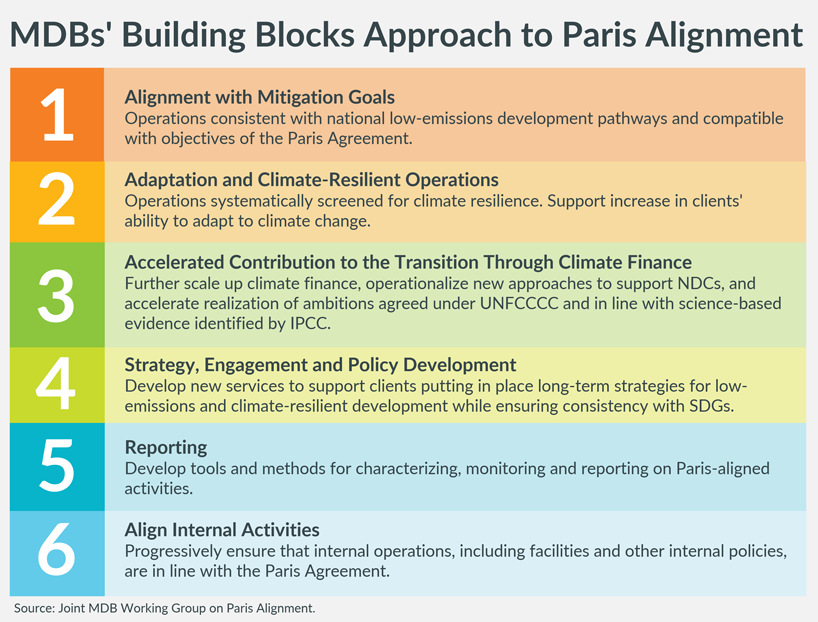The Paris Agreement sets out the ambitious task of aligning all financial flows with its goals to avoid the worst impacts of warming. Multilateral Development Banks (MDBs) have an important role to play in making this goal a reality. Their development mandates, technical expertise, and track record on climate finance mean that MDBs can lead the way by helping developing countries avoid fossil fuel-intensive development pathways, by developing the necessary standards and investment criteria to assess the alignment of investments with the Paris Agreement’s goals, and by helping to mobilise increased volumes of climate finance.
In 2016, MDBs1 committed to align their financial flows with the goals of the Paris Agreement. This requires MDBs to ensure that all their activities advance low-carbon, climate resilient-development pathways, or at least not undermine these goals. At COP25 in December 2019, the MDBs presented an update on their alignment progress. While their initial steps show promise, important gaps and open questions remain.
This year, the MDBs must rapidly step up their efforts to advance the Paris alignment agenda. As outlined in a series of memos prepared by Germanwatch, NewClimate Institute, and World Resources Institute, here’s how the MDBs can deliver on their commitment announced in 2016.

The MDBs need to move faster
Under their proposed timeline, MDBs will not fully implement their Paris alignment approach until 2023 or 2024 – eight years after their pledge made in 2016. While processes to assess Paris alignment take time to develop and implement, this timeline does not reflect the urgency of the task at hand. Additionally, the frameworks MDBs are developing to assess alignment will initially only apply to new direct investment lending operations. MDBs will not evaluate their existing portfolios. They will not begin evaluating intermediated finance and policy-based lending for alignment until 2021 or 2022.
Relatedly, with the exception of the European Investment Bank, MDBs have not yet announced a date after which they will only finance aligned projects2. Even as they flesh out their approach to determine the Paris alignment of new projects, most of the MDBs have not committed to make a project’s Paris alignment a determining factor for project approval. Instead, assessment of Paris alignment is just another input in the project approval process, and MDBs are free to approve projects that are found to be non-aligned.
Consequently, we propose:
- MDBs should develop and fully implement their Paris alignment framework as soon as possible, in order to accelerate and scale up finance in the key areas to enable the economy-wide and sectoral transformations the Paris Agreement's objectives require.
- Each MDB should set a target date in the near future after which all new commitments will be Paris-aligned. Bank shareowners, represented by Executive Directors on boards, should support and encourage the process.
Mitigation Framework Remains Vague. It’s Time to Fill in the Details
MDBs have outlined the broad strokes of a framework to assess alignment with Paris Agreement mitigation goals. Under their proposed framework, the MDBs will first screen potential investments with positive and negative lists. For investments not included on either list, the MDBs propose to develop more specific assessment criteria. MDBs will exclude projects that are inconsistent with national climate policies, including Nationally Determined Contributions and Long-Term Strategies. Additionally, MDBs will assess the consistency of projects with sector-specific Paris Alignment pathways, considering differentiated responsibilities and capabilities of countries, they will apply a no-regret test, and they will assess the stranded asset and transition risks associated with potential projects.
However, the MDBs have not yet disclosed what might be on their positive and negative lists, and the details of their specific assessment criteria are left largely undefined. They have not, for example, explained what sector-specific benchmarks they will apply or how they will take the local country context and circumstances into account.
As a result, we propose that:
- MDBs agree on and publish common positive and negative lists for Paris Alignment based on current science, importantly the IPCC Special Report on Warming of 1.5C. We make suggestions for positive and negative lists, as well as further decision making for the energy and transport sectors here.
- In general, MDBs should adopt a conservative approach in applying their specific assessment critiera. They should develop and publish more detailed guidelines on how consistency how consistency with (i) country long-term strategies, (ii) global sectoral pathways, (iii) no-regret tests and (iv) economic analysis accounting for stranded asset risks will be assessed and what current scientific research has been used to establish those benchmarks.
More Clarity Needed on Adaptation and Resilience
MDBs have also begun to develop an alignment framework for adaptation and resilience. That framework calls for project evaluation teams to consider both the resilience of potential investments and the broader resilience gains that can be achieved through potential investments in resilience. They do so by asking if project development has included a robust assessment of physical climate risks and ample consideration of climate resilience opportunities. However, the approach provides too little guidance to project teams. For instance, the process does not specify the particular steps a “robust assessment of physical climate risks” requires, nor does it define resilience opportunities.
We make the following suggestions related to adaptation and resilience:
- MDBs should develop a common process for quantifying physical climate risks and incorporating those risks, along with adaptation options, into project economic and financial assessments.
- Additionally, MDBs should define a range of adaptation and resilience metrics that allow them to assess the impact and effectiveness of adaptation finance.
Better, Standardized Reporting
The MDBs have committed to report on alignment status of all investments, including where assessments are inconclusive. The MDBs have also said that they will report on a number of things including indicators measuring impacts under each building block, risk scenario methodologies, and risk management processes under their reporting building block.
However, MDBs have yet to disclose the exact metrics they will report on or their timeline for reporting. Moreover, it is unclear if the different banks will adopt a shared approach to reporting.
To address these concerns:
- MDBs should begin tracking progress towards Paris alignment in 2020 by reporting on new aligned and misaligned commitments, as well as the overall ratio of aligned-to-misaligned assets.
- MDBs should work towards common Paris-alignment reporting in a joint annual report, using joint scenario analysis methodologies and common impact metrics.
- MDBs should publicly disclose the results of transition risk and physical risk analyses for individual projects and aggregated at the portfolio level. They should also report on their climate risk management strategies.
This blog was written in cooperation with WRI and Germanwatch. Further discussion and key recommendations on climate finance, policy development, and internal operations can be found in our memos.
1 The 9 MDBs are African Development Bank (AfDB), Asian Development Bank (ADB), Asian Infrastructure Investment Bank (AIIB), European Bank for Reconstruction and Development (EBRD), European Investment Bank (EIB), InterAmerican Development Bank (IADB), Islamic Development Bank (IsDB), New Development Bank, and World Bank Group.
2 Even at the European Investment Bank, although the bank has announced that all financing activities will be aligned from the end of 2020, so called “Projects of Common Interest” will be financed regardless of their Paris alignment through the end of 2021.





